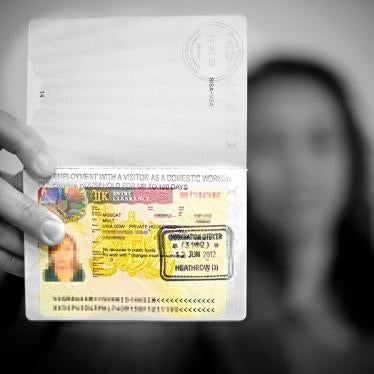The Home Secretary, Theresa May, has committed to abolish what she calls "modern day slavery", and within weeks will present a bill to parliament making it easier to prosecute and punish those responsible for human trafficking, forced labour, domestic servitude and slavery. But one highly vulnerable group - migrant domestic workers - are currently omitted from the scope of the proposed legislation. The government is doing far too little to protect them, and through changes to immigration rules, has actually made it harder for them to access help.
Each year, around 15,000 migrant domestic workers arrive in the UK on short-term visas to work as cooks, cleaners, housekeepers and nannies for wealthy foreign families. Many of them are women from very poor backgrounds in countries like the Philippines, Morocco, India, Nigeria, Sri Lanka and Indonesia. Employers are often drawn from Gulf states, and stay in some of London's most expensive neighbourhoods. Yet new research published this week by Human Rights Watch shows these workers are being subjected to very serious abuses.
Domestic workers have told Human Rights Watch that their passports were confiscated by their employers, and that they were locked inside and physically unable to leave the home. Others were threatened by their employers that they would be arrested and deported if they ran away. They were also prevented from making contact with their families overseas, and denied a mobile phone or other means of communication.
Many experienced verbal, physical or psychological abuse, including being slapped by employers, repeatedly shouted at and called "animals" or "dogs". One domestic worker, Linda S* from the Philippines, was told by her employer: "I can kill you and throw you to the sea".
Domestic workers we interviewed said they worked exceptionally long hours - up to eighteen hours a day, 7 days a week, with no rest days. Although UK employers are supposed to pay their workers the National Minimum Wage, in most cases the wages paid to them came nowhere close to this. Some workers were paid as little as £100 a month; others received no payment at all. Workers also described being denied adequate food, appropriate sleeping arrangements or any semblance of dignity or privacy. One worker, Ira A* from the Philippines, deprived of income and basic toiletries, was forced to make sanitary towels for herself out of children's nappies.
Although we and others have documented a clear pattern of abuse against migrant domestic workers in the UK, the government has so far rejected calls for further measures of protection. Shockingly, in June 2011, the UK was one of only 9 countries worldwide that did not vote in favour of the International Labour Organisation's Domestic Workers Convention, although the US and every European country (except the Czech Republic) did so. The UK justified its refusal to sign by saying that legal protections here for domestic workers are sufficient to prevent abuse. This claim is clearly wrong.
Worse still, recent changes to UK immigration rules have made it harder for migrant domestic workers to escape abusive employers. In April 2012, the government introduced a tied-visa scheme, which means that migrant domestic workers can no longer legally work for another employer. Now, if they flee their employer in response to abuse, they become undocumented migrants, vulnerable to exploitation in the informal economy and living in fear of the authorities. The government made the change despite a wealth of evidence, not least from the Gulf, that being able to change employer is one of the most practical ways for domestic workers to escape abusive situations. This analysis is shared by UN and other international experts working on migrant worker rights.
The government's forthcoming Modern Slavery Bill and accompanying Action Plan is an obvious and appropriate vehicle for tackling forced labour and other serious abuses against migrant domestic workers in the UK. The government should end the tied-visa rule. This could be done without offering a right of permanent settlement. The government should also make the confiscation of someone's passport a specific criminal offence, ratify the ILO Convention on Domestic Workers, and revise the Working Time Regulations to include domestic workers. In addition, much stronger procedures and mechanisms should be established to explain to domestic workers their rights in the UK and how they can seek redress in cases of abuse. Foreign employers should also be left in no doubt as to their legal obligations while in the UK - and the cost of breaching them.
While Theresa May deserves credit for taking on the issue of modern day slavery, the omission of migrant domestic workers from the legislation weakens the thrust of her initiative and will permit very serious abuses to continue unchecked. The government should think again, broaden the scope of its legislation and introduce new mechanisms to properly protect some of the most vulnerable people in our society.
*Names have been changed to protect the domestic workers' identity.






